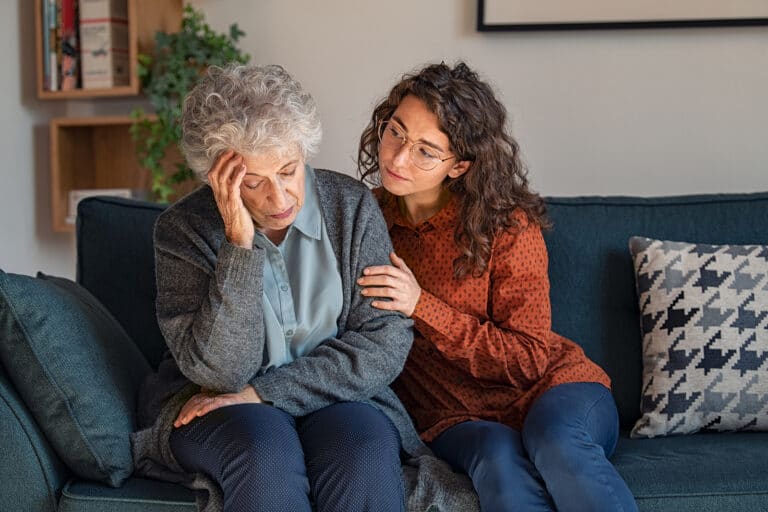Unfortunately, people with Alzheimer’s disease aren’t just faced with some memory loss. They often experience paranoia, hallucinations, and delusions, too. As a family caregiver, it is a good idea for you and your In-Home Care provider to learn about these complex changes, so you will know how to handle them better.
Dealing with Hallucinations and Delusions
Before figuring out how to cope with hallucinations and delusions, it is a good idea to figure out what these things mean.
Hallucinations involve feeling, smelling, seeing, and hearing things that aren’t real. For instance, if your elderly loved one has Alzheimer’s disease, they may see people coming into their house, when really nobody has entered the door for the past couple of hours when the home care assistance provider showed up.
Delusions are beliefs that someone thinks are real, but they are actually false. For instance, your elderly loved one might think their family member is lying to them when they are really telling the truth.
Some of the tips that can be used to help your elderly loved one handle the delusions and hallucinations include:
- Try your best not to argue with them
- Switching medications that may be causing the issue
- Distraction techniques
- Turning off violent, aggressive, or upsetting television shows or movies
- Listen to calming music or radio stations
- Make sure all dangerous objects are put up and out of the way of your elderly loved one
If you and home care assistance providers use these tips, hopefully, it will not only help to manage your loved one’s delusions and hallucinations but help to prevent some of them, as well.
Dealing with Paranoia
Paranoia is a kind of delusion when someone believes – without any real reason – that someone is out to get them in some manner or another. For instance, your elderly loved one might become suspicious that you are being unfair regarding them not leaving the house on their own.
There are numerous tips to help your elderly loved one cope with paranoia including, but not limited to, the following:
- Do your best not to negatively react when your elderly loved one blames you for anything
- Don’t argue with your elderly loved one
- Let them know that they are safe
- Use hugs or another gentle touch to help show you love and care for them
- Help search for things that “went missing” to show your elderly loved one you believe them
- Don’t take things personally (your elderly loved one doesn’t know what is happening and they don’t know their beliefs are false)
If you and home care assistance providers can use these tips with your elderly loved one, hopefully, it will help to reduce their paranoid thoughts and beliefs.
Conclusion
These are some of the facts regarding dealing with paranoia, delusions, and hallucinations in Alzheimer’s disease patients. If you or a home care provider is caring for your elderly loved one and they experience these 3 issues, use the tips mentioned above right away.
If you or an aging loved one is considering In-Home Care in Shelby Township, MI, please contact the caring staff at New Century Home Health Care today. (248) 398-9600
Sources
https://www.nia.nih.gov/health/alzheimers-and-hallucinations-delusions-and-paranoia
Home Health Care is tailored to assist the individual and family to achieve the optimal level of health, prevent hospitalization and provide care and support for the family. Services are delivered on an intermittent basis according to a plan of treatment established by the patient/family, patient’s physician and the home health professionals.
Our services range from skilled nursing care and rehabilitation, to personal care and living assistance services. Our goal is to provide a variety of professional skilled and non-skilled services that will enable our clients to receive the care they need right in their homes.
We would like to take the opportunity to show you our company’s commitment to not just meet, but also exceed home health care delivery standards. New Century Home Health Care, Inc.’s mission is to build a positive, trusting relationship with you.
- Help Your Senior Loved One Feel Younger - December 9, 2022
- Home Health Care Fills in Care Gaps for Seniors - November 23, 2022
- The Benefits of Mediation for Seniors - November 4, 2022



